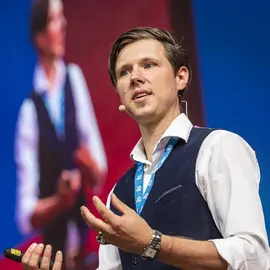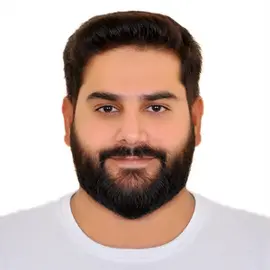Machine Perception and Cognition Group

“AI is THE key technology of the digital transformation, across sectors and industries, with major effects on our societies. Our research thus makes major contributions to the development of robust and trustworthy AI methods, and we enthusiastically teach their safe implementation and application.”
Fields of expertise

- Pattern recognition with deep learning
- Machine perception, computer vision and speaker recognition
- Neural system development
The MPC group conducts pattern recognition research, working on a wide variety of tasks relating to image, audio, and signal data per se. We focus on deep neural network and reinforcement learning methodology, inspired by biological learning. Each task we study has its own learning target (e.g., detection, classification, clustering, segmentation, novelty detection, control) and corresponding use case (e.g., predictive maintenance, speaker recognition for multimedia indexing, document analysis, optical music recognition, computer vision for industrial quality control, automated machine learning, deep reinforcement learning for automated game play or building control), which in turn sheds light on different aspects of the learning process. We use this experience to create increasingly general AI systems built on neural architectures.
Services
- Insight: keynotes, trainings
- AI consultancy: workshops, expert support, advise, technology assessment
- Research and development: small to large-scale collaborative projects, third party-funded research, student projects, commercially applicable prototypes
Team
Head of Research Group
Projects
-
Automated Music Track Extraction and Identification from Full-Length Movies (soundtrackID )
We are developing an end-to-end system for the automatic detection, segmentation, and identification of music in full-length movies. Audio is analyzed in one-second windows using pretrained models, merged into candidate tracks, reviewed, and submitted to external APIs; identification accuracy is…
current, 02/2026 - 03/2027
-
SCRAI – A Think-and-Do-Tank for Responsible Development and Societal Alignment of Artificial Intelligence Systems
SCRAI brings responsible AI to the ground by bridging the gap between societal values and development of AI technology and solutions. The SCRAI Think-and-Do Tank will help organizations to exploit the potential of AI while complying with legal requirements and being compatible with societal…
current, 04/2025 - 12/2029
-
dAIrector – Automated multi-camera live production for events (dAIrector)
The dAIrector automates multi-cam live productions of concerts, theatre, comedy, musicals through creative AI direction following the dramaturgy on stage. It provides small stages, events, festivals, and artists access to a worldwide audience via YourStage.live.
current, 01/2025 - 12/2027
-
Study on semi-automatic poster cataloguing at the Swiss National Library (SemPla)
Numerous new posters and bills arrive daily at the Swiss National Library to be added to its catalogue. How can the process of poster cataloguing be enhanced by current AI systems?
expired, 05/2024 - 11/2024
-
Deep Dive ML on Simulated Enzyme-Electrolysis Performance
The goal of this pilot study is to research requirements needed to develop a computational model that simulates the fluidic and electro-biochemical dynamics in the power-to-liquid process in order to optimise the performance, efficiency and longevity of enzymes.
expired, 11/2023 - 03/2024
-
AI for REAL-world NETwork operation (AI4REALNET)
The scope of AI4REALNET covers the perspective of AI-based solutions addressing critical systems (electricity, railway, and air traffic management) modelled by networks that can be simulated, and are traditionally operated by humans, and where AI systems complement and augment human abilities. It…
current, 10/2023 - 03/2027
-
Stability of self-organizing net fragments as inductive bias for next-generation deep learning
We recently released "A Theory of Natural Intelligence", proposing a possible key to the emergence of intelligence in biological learners. Goal of this fellowship is to develop a technical implementation of the concept of self-organizing netfragments within contemporary deep artificial neural nets.
expired, 09/2023 - 08/2025
-
Machine Learning for Body Composition Analysis (ML-BCA)
The Centre for Artificial Intelligence (CAI) of the ZHAW, together with the Cantonal Hospital Aarau, has laid the foundations for machine learning-supported body composition analysis on image files of the KSA within the framework of preliminary studies and has achieved promising results. The aim of…
expired, 04/2023 - 03/2025
-
3D-Master for a Digitized Manufacturing Platform
We enhance Bossard's Real Time Manufacturing Services by automatically creating quotes for special parts. The core is an AI-created 3D Master that unifies all available part information, enabling pricing and feasibility evaluation for many manufacturing technologies incl. additive…
expired, 12/2022 - 05/2025
-
certAInty – A Certification Scheme for AI systems (certAInty)
Certification of AI Systems by an accredited body increases trust, accelerates adoption and enables their use for safety-critical applications. We develop a Certification Scheme comprising specific requirements, criteria, measures, and technical methods for assessing Machine Learning enabled…
expired, 11/2022 - 12/2024
-
DISTRAL: Industrial Process Monitoring for Injection Molding with Distributed Transfer Learning
We develop a distributed machine learning system to sort out defect plastic parts during production. Main challenge is the transferability of learnt process know-how from case to case; the solution builds on domain adaptation, continual data-centric deep learning and federated edge computing.
expired, 10/2022 - 03/2025
-
AI powered CBCT for improved Combination Cancer Therapy (AC3T)
The project enables a novel, combined, adaptive cancer therapy combining tumor treating field and radiation therapy due to significantly improved static (3D) and time-resolved (4D) low dose Cone Beam Computer Tomography images based on artificial intelligence image reconstruction algorithms.
expired, 05/2022 - 02/2025
-
AUTODIDACT – Automated Video Data Annotation to Empower the ICU Cockpit Platform for Clinical Decision Support
Monitoring diverse sensor signals of patients in intensive care can be key to detect potentially fatal emergencies. But in order to perform the monitoring automatically, the monitoring system has to know what is currently happening to the patient: if the patient is for example currently being moved…
expired, 02/2022 - 12/2022
-
Pilot study machine learning for injection molding processes

Researchers from the CAI and InES conduct a technical deep dive together to explore the possibilities of capturing process knowledge on injection molding in deep neural networks and transfer the results to novel usage scenarios.The groups of Prof. Stadelmann (Computer Vision, Perception & Cognition,…
expired, 09/2021 - 03/2022
-
Good practices for responsible development of AI-based applications in healthcare
This project will identify proven methods, practices and standards that support responsible research and development of AI systems for health. They will be tested in use cases from medical imaging and neurotechnology, publicly released and published as a guideline of recommended best practices.
expired, 09/2021 - 08/2023
-
Accessible Scientific PDFs for All
PDF is the most popular document format to provide and distribute information on the internet. It was developed by Adobe 1996 but has been an open format since 2008. It was estimated in 2015 that more than 2.5 trillion PDF documents exist on the internet, covering all aspects of life and research,…
expired, 04/2021 - 05/2025
-
Synthetic data generation of CoVID-19 CT/X-rays images for enabling fast triage of healthy vs. unhealthy patients
The automatic analysis of X-ray/CT images through artificial intelligence models can be useful to automate the clinical scanning procedure. Nonetheless, the limited access to real COVID patient data leads to the need of synthesizing image samples. The goal of this project is to use existing CT/X-ray…
expired, 05/2020 - 07/2020
-
Standardized Data and Modeling for AI-based CoVID-19 Diagnosis Support on CT Scans (SDMCT)
Hospitals and research institutes are highly investigating applications of AI in medical imaging. However, developed models and datasets are barely mergeable, and the research results are not reproducible on different datasets due to different CT scanners used. Radiologists told us that “unifying…
expired, 05/2020 - 10/2020
-
DIR3CT: Deep Image Reconstruction through X-Ray Projection-based 3D Learning of Computed Tomography Volumes
Project DIR3CT aims at improving the image quality of CBCT images by deep learning (DL) the 3D reconstruction from X-ray images end-to-end. This enables a novel CBCT product to be used during radiation therapy and will allow the use of these images for adaptive treatment.
expired, 02/2020 - 05/2022
-
TAILOR – Foundations of Trustworthy AI - Integrating Reasoning, Learning and Optimization
The main ambition of TAILOR is to build the capacity of providing the scientific foundations for Trustworthy AI in Europe by developing a network of research excellence centers with a technical focus on combining research excellence in the areas of learning, optimisation and reasoning . The current…
expired, 01/2020 - 12/2021
Publications
-
Hibraj, Feliks; Vascon, Sebastiano; Stadelmann, Thilo; Pelillo, Marcello,
2018.
Speaker clustering using dominant sets[paper].
In:
2018 24th International Conference on Pattern Recognition (ICPR).
24th International Conference on Pattern Recognition (ICPR 2018), Beijing, China, 20-28 August 2018.
IEEE.
pp. 3549-3554.
Available from: https://doi.org/10.1109/ICPR.2018.8546067
-
Amirian, Mohammadreza; Schwenker, Friedhelm; Stadelmann, Thilo,
2018.
Trace and detect adversarial attacks on CNNs using feature response maps[paper].
In:
Artificial Neural Networks in Pattern Recognition.
8th IAPR TC3 Workshop on Artificial Neural Networks in Pattern Recognition (ANNPR), Siena, Italy, 19-21 September 2018.
Springer.
pp. 346-358.
Lecture Notes in Computer Science ; 11081.
Available from: https://doi.org/10.1007/978-3-319-99978-4_27
-
Meier, Benjamin; Stadelmann, Thilo; Stampfli, Jan; Arnold, Marek; Cieliebak, Mark,
2017.
Fully convolutional neural networks for newspaper article segmentation[paper].
In:
Proceedings of the 14th IAPR International Conference on Document Analysis and Recognition (ICDAR).
14th IAPR International Conference on Document Analysis and Recognition (ICDAR 2017), Kyoto Japan, 13-15 November 2017.
Kyoto:
CPS.
Available from: https://doi.org/10.21256/zhaw-1533
-
Lukic, Yanick X.; Vogt, Carlo; Dürr, Oliver; Stadelmann, Thilo,
2017.
Learning embeddings for speaker clustering based on voice equality[paper].
In:
2017 IEEE 27th International Workshop on Machine Learning for Signal Processing (MLSP).
27th IEEE International Workshop on Machine Learning for Signal Processing (MLSP 2017), Tokyo, 25-28 September 2017.
IEEE.
Available from: https://doi.org/10.1109/MLSP.2017.8168166
-
Stockinger, Kurt; Stadelmann, Thilo; Ruckstuhl, Andreas,
2016.
In:
Fasel, Daniel; Andreas, Meier, eds.,
Big Data.
Wiesbaden:
Springer.
pp. 59-81.
Edition HMD.
Available from: https://doi.org/10.1007/978-3-658-11589-0_4
Other releases
| When | Type | Content |
|---|---|---|
| 2023 | Extended Abstract | Thilo Stadelmann. KI als Chance für die angewandten Wissenschaften im Wettbewerb der Hochschulen. Workshop (“Atelier”) at the Bürgenstock-Konferenz der Schweizer Fachhochschulen und Pädagogischen Hochschulen 2023, Luzern, Schweiz, 20. Januar 2023 |
| 2022 | Extended Abstract | Christoph von der Malsburg, Benjamin F. Grewe, and Thilo Stadelmann. Making Sense of the Natural Environment. Proceedings of the KogWis 2022 - Understanding Minds Biannual Conference of the German Cognitive Science Society, Freiburg, Germany, September 5-7, 2022. |
| 2022 | Open Reserach Data | Felix M. Schmitt-Koopmann, Elaine M. Huang, Hans-Peter Hutter, Thilo Stadelmann, and Alireza Darvishy. FormulaNet: A Benchmark Dataset for Mathematical Formula Detection. One unsolved sub-task of document analysis is mathematical formula detection (MFD). Research by ourselves and others has shown that existing MFD datasets with inline and display formula labels are small and have insufficient labeling quality. There is therefore an urgent need for datasets with better quality labeling for future research in the MFD field, as they have a high impact on the performance of the models trained on them. We present an advanced labeling pipeline and a new dataset called FormulaNet. At over 45k pages, we believe that FormulaNet is the largest MFD dataset with inline formula labels. Our dataset is intended to help address the MFD task and may enable the development of new applications, such as making mathematical formulae accessible in PDFs for visually impaired screen reader users. |
| 2020 | Open Research Data | Lukas Tuggener, Yvan Putra Satyawan, Alexander Pacha, Jürgen Schmidhuber, and Thilo Stadelmann, DeepScoresV2. The DeepScoresV2 Dataset for Music Object Detection contains digitally rendered images of written sheet music, together with the corresponding ground truth to fit various types of machine learning models. A total of 151 Million different instances of music symbols, belonging to 135 different classes are annotated. The total Dataset contains 255,385 Images. For most researches, the dense version, containing 1714 of the most diverse and interesting images, is a good starting point. |







